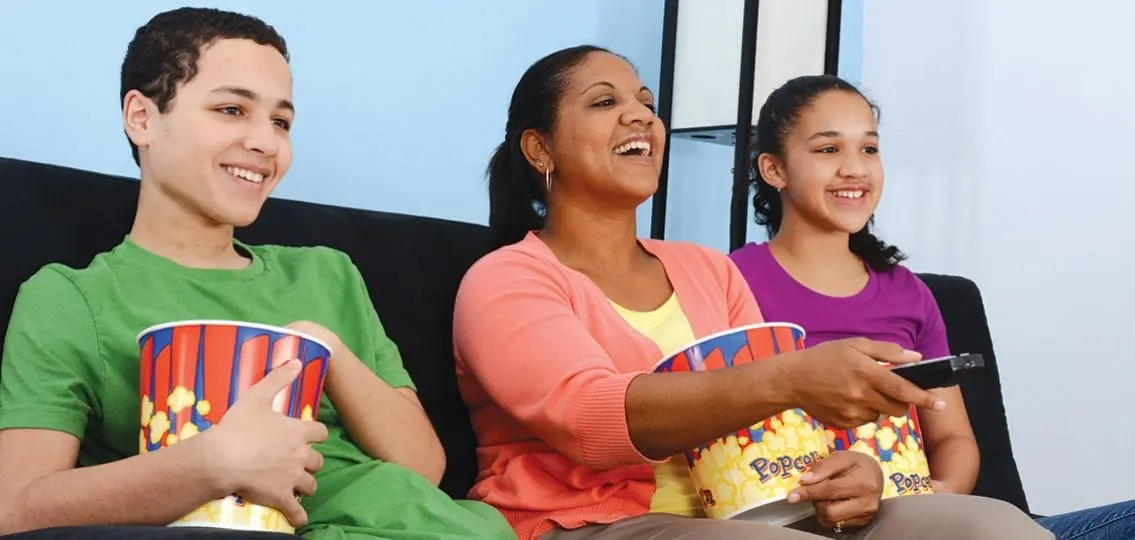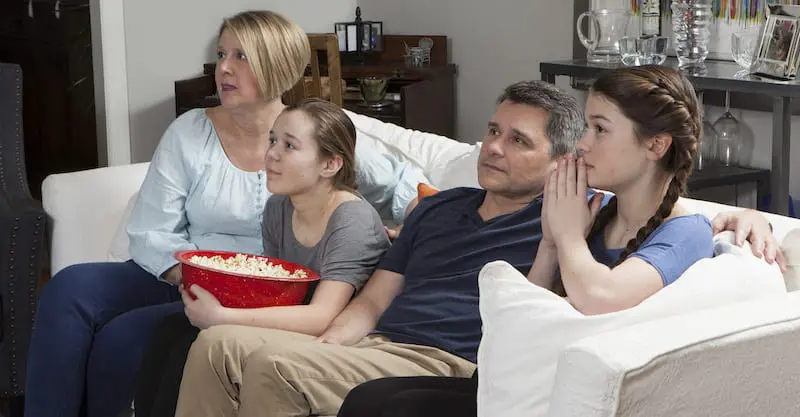Before I became a mother, I swore that I would not let my future children watch television, especially when they were young. That lofty idea went out the window when I was home alone with a toddler, who exhausted me by 10 a.m.
By the time my daughter was two years old and I was pregnant with her brother, we had developed a routine of going to the park in the morning and returning home for lunch, after which we’d settle on the sofa to watch Arthur, followed by Zoboomafoo, on PBS. But we weren’t just watching; we were engaged. She asked a million questions, and we’d discuss everything that was happening on the screen. These are some of my happiest memories of my daughter’s younger years.
Over the years, my children and I have shared many happy moments in front of the TV: eating in the kitchen and laughing to iCarly, gathering with their father for American Idol, and enjoying the sharp political satire of Stephen Colbert. When my children were 10 and 7, we watched the PBS production of The Diary of Anne Frank in short installments, which gave us the opportunity to discuss each episode and allowed them to learn about World War II from a child’s perspective.
Now that my children are teenagers and often holed up in their rooms glued to various screens, television is a way for us to come together, and to continue learning. Watching Black-ish spurs discussion about race in America; during Kids Baking Championship we talk about the importance of kindness.
1. TV Can Spark Conversation
Despite concerns about screens that date back decades, TV is not inherently bad, says Dr. Eric Rasmussen, author of Media Maze and an assistant professor at Texas Tech University whose research focuses on children and media.
“Watching together gives families the opportunity to talk about things, even hard things,” says Rasmussen. Parents shouldn’t pretend that unpleasant topics don’t exist. “Our first reaction is to circle the wagons and prevent them from watching certain media,” but rules alone don’t usually work, because teens regularly share media with each other away from parent supervision.
By watching together, we can go from protecting our kids to empowering them, giving them the tools to deal with difficult content.
2. Pay Attention to Content
But it pays to be selective about programming. If parents and teens are watching together, it can be tempting to think that any and all content is okay since we’re chaperoning, says Rasmussen. “But there’s a whole bunch of research on co-viewing that shows that when parents and kids watch TV together, it enhances all the effects of that content, for good and bad,” he says.
“We can selectively choose TV with good lessons to watch,” he adds. “It can help supplement the lessons and morals we are trying to instill in our kids.”
Dr. Richard Freed, a child and adolescent psychologist and the author of Wired Child: Reclaiming Childhood in a Digital Age, agrees that watching programming together isn’t enough when it “glamorizes violence, unhealthy sexuality, or other problem behaviors.”
“Media is so powerful, and the people who put together the shows are so good at communicating those messages, that I struggle to believe a parent’s comment can undo that messaging,” Freed says. “It’s not realistic for parents to step up every few minutes to talk about the perils of violent or unhealthy sexual behavior. I much prefer parents finding a show to watch with teens that sends a more positive, or at least not negative, message.”
In an ideal world, says Freed, parents and kids would have a movie or show that brings everyone together. In Freed’s family, Elf is the go-to movie for shared laughs.
“Much like going to the same restaurant for a birthday, it’s the 15th time you’ve all seen the movie, and it’s a shared family experience,” Freed says.
3. Leave Phones in Another Room
When families do watch a show or movie together, it’s vital for everyone to leave their phones in another room, and really focus on the experience together. Even if the phone is on silent, if a parent picks it up, it can hurt kids’ feelings and normalize the whole family being on their phones.
“A lot of the kids I work with will say, ‘We’ll watch a movie, but my mom’s on her phone,’” says Freed. “We don’t recognize how hurtful this is, as kids feel we’re choosing to do something else rather than be with them.”
I have to confess to being one of those moms who was always on my phone, until my kids spoke up and told me how ignored it made them feel. Now, before we head to the TV room, I leave my phone on silent in the kitchen. At first it was hard to disconnect, but I now relish the time to spend with them, completely uninterrupted.




